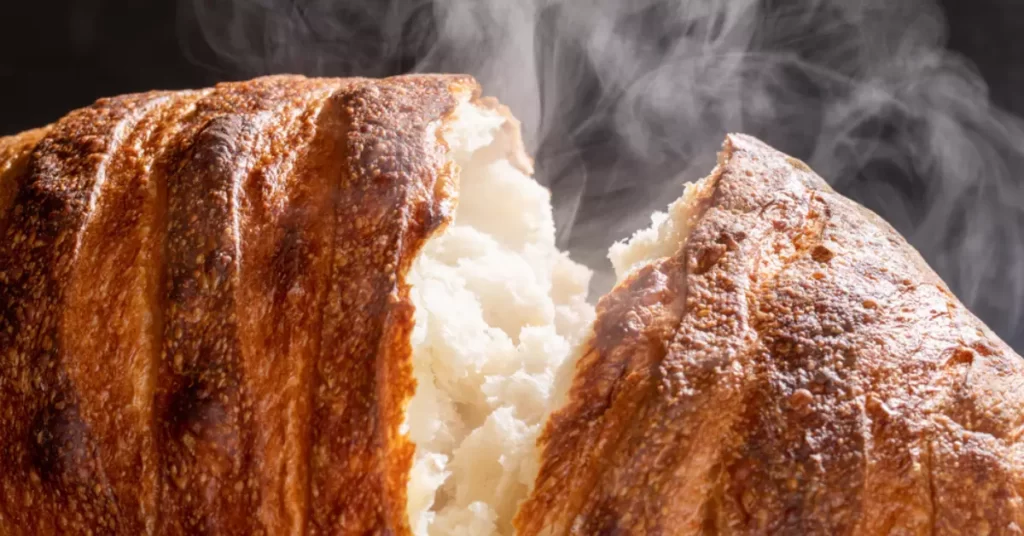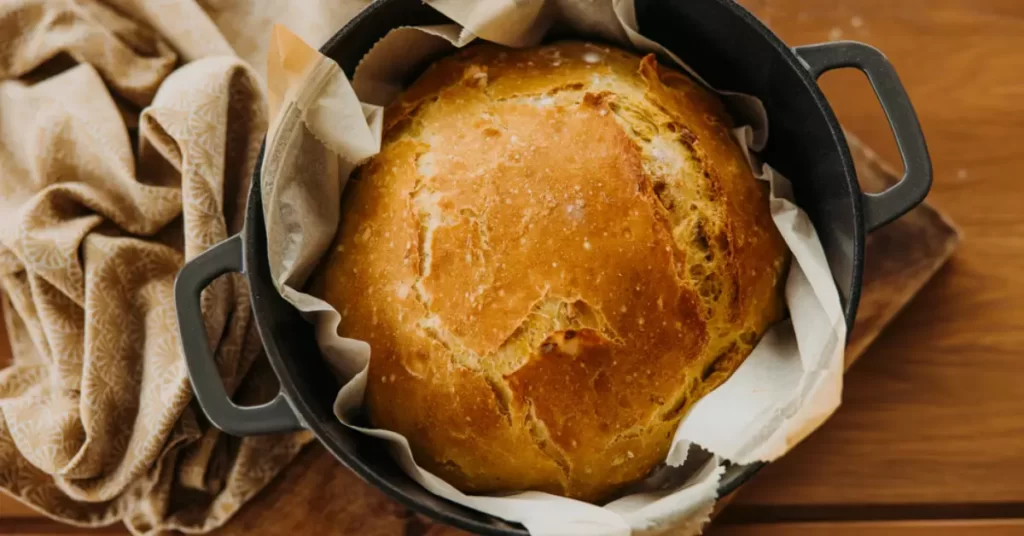The humble loaf of bread, a staple in many households around the world, can transform from a simple ingredient into a warm, fragrant centerpiece that fills the air with an irresistible aroma. But as the loaf cools on the counter, many of us are tempted to dive in right away, despite common advice suggesting that we should wait.
Answering the question: “Is warm bread bad for you?” might seem straightforward, but it requires a deep dive into the world of bread making, digestion, and food safety. The truth is, warm bread can indeed be eaten, although there are considerations and potential downsides that might make you think twice.
The following discourse aims to dispel myths and provide factual information on the subject. From understanding bread to the science behind eating it warm, this comprehensive look will shed light on the effects of devouring your favorite loaf straight from the oven.
Understanding Bread
The Definition and Importance of Bread
Bread is one of the world’s oldest prepared foods with a significant place in most cultures. At its simplest, bread is a product of baking a mixture of flour and water. However, it can vary widely in taste, texture, and nutritional content depending on the ingredients used and the baking method. Its versatile nature and high-energy content have made it a staple food item globally, underscoring its importance in our daily diet.
Different Types of Bread
There are many types of bread, ranging from whole grain to sourdough to gluten-free varieties, each with unique characteristics and health benefits. Whether it’s the tangy taste of rye or the soft texture of brioche, each type of bread offers a different culinary experience.
The Process of Baking Bread
Baking Bread: An Art and a Science
Baking bread is an intricate process that combines the principles of chemistry, biology, and culinary arts. From choosing the ingredients to kneading the dough, proofing, shaping, and finally baking, each step plays a crucial role in determining the bread’s flavor, texture, and appearance.
Why Does Bread Warm Up?
During baking, the yeast in the dough consumes sugars, releasing carbon dioxide gas and steam in the process. This causes the bread to rise and form pockets of air, which give the bread its fluffy texture.
The heat also turns the dough’s outer layer into a golden-brown crust. This process is known as the Maillard reaction, a chemical reaction between amino acids and reducing sugars that gives browned food its distinctive flavor.

Is Eating Warm Bread Bad for You?
Challenging Popular Beliefs
For ages, people have savored warm bread straight from the oven. However, common wisdom often suggests letting the bread cool before slicing and eating. The reasoning behind this belief lies primarily in the texture of the bread and how our bodies digest it.
Expert Opinions on Eating Warm Bread
Most experts agree that eating warm bread is not harmful in itself. However, they also point out that slicing into a loaf of warm bread can result in a gummier texture that could be a little tougher on digestion. Still, this does not present a significant health risk for most individuals.
The Science Behind Eating Warm Bread
What Happens to the Body When You Eat Warm Bread?
When you eat warm bread, your body starts the digestion process. Carbohydrates in the bread are broken down into simple sugars by enzymes in the saliva and the stomach, then absorbed into the bloodstream. However, if the bread’s texture is gummy because it’s still warm, this might slow down the digestion process, possibly causing discomfort in some individuals.
Impact of Warm Bread on Digestion
While warm bread is generally safe to eat, it could potentially be more challenging to digest due to its gummier texture. This is because the steam inside the bread hasn’t had the chance to escape, leading to a denser consistency. However, everyone’s digestive system is different, and not everyone will experience discomfort.
Potential Benefits of Eating Warm Bread
Preservation of Nutrients
Bread, in general, contains a variety of nutrients, including dietary fiber, B vitamins, and minerals such as iron, magnesium, and selenium. Eating bread warm does not significantly affect these nutrients. Moreover, the warmth might enhance the flavors, making it more enjoyable to consume.
Impact on Mood and Satisfaction
Eating warm bread can stimulate the senses and provide comfort. It triggers feelings of satisfaction and could potentially boost mood, thanks to the appealing taste and aroma. However, as with all foods, it’s important to enjoy warm bread in moderation as part of a balanced diet.

Potential Risks of Eating Warm Bread
The Downside of Warm Bread
While there’s no direct harm in eating warm bread, there are a couple of considerations. One is the aforementioned gummy texture of warm bread, which could potentially make it harder for some individuals to digest. The other is that cutting into the bread before it’s fully cooled can affect the overall texture and structural integrity of the loaf.
The Myth about Yeast and Warm Bread
There’s a common misconception that eating warm bread can cause yeast to continue fermenting in your stomach, leading to digestive issues. However, this is not the case, as the baking process kills yeast, and it cannot become active again in your stomach. The heat of baking neutralizes the yeast, so it’s not a cause for concern.
Tips for Eating Bread
The Best Time to Eat Bread After Baking
While it’s tempting to slice into a fresh loaf right out of the oven, patience pays off when it comes to bread. Allowing the bread to cool for at least 20 minutes to a couple of hours, depending on the size of the loaf, helps set the structure and enhances the texture and flavor. Cutting too soon can result in a gummy, less appetizing interior.
Storing and Reheating Bread Safely
Proper storage is key to maintaining the quality of your bread. Once cooled, store the bread in a bread bin or a clean, dry, airtight container to keep it fresh. If you prefer warm bread, you can reheat it in an oven or toaster. Remember, reheating should be brief; overdoing it can dry out your bread.
Frequently Asked Questions About Eating Warm Bread
Can You Eat Warm Bread?
Yes, you can eat warm bread. While it’s usually better to wait until the bread has cooled down to cut it, consuming warm bread does not pose a significant health risk.
Does Warm Bread Cause Indigestion?
Eating warm bread does not typically cause indigestion. However, if the bread has a gummy texture because it was cut too soon after baking, it might be slightly harder to digest. This doesn’t cause issues for most people, but if you have a sensitive stomach, it’s a good idea to let the bread cool before eating.
Is It Safe to Eat Bread Right Out of the Oven?
Yes, it’s safe to eat bread right out of the oven. But for optimal texture and flavor, it’s recommended to let it cool down before slicing and eating.
Conclusion
While the lure of warm, freshly baked bread can be hard to resist, understanding the potential benefits and drawbacks helps you make informed decisions about your bread-eating habits. It’s safe to eat warm bread, but waiting for it to cool before cutting can enhance your eating experience by improving texture and flavor. Remember, each person’s digestion is unique, and what works for one may not work for another.
In the end, bread – whether warm or cooled – remains a comforting, versatile food that’s enjoyed across the globe. As part of a balanced diet, it can provide important nutrients and contribute to a sense of well-being. So the next time you pull a loaf of bread out of the oven, take a moment to appreciate the science and artistry behind it – and then enjoy it in the way that suits you best.
